
Tomorrow, voters will go to the polls in what what many are dubbing the most important American election in a generation—a battle not simply for 435 House and 33 Senate seats, but (it seems at times) for the very soul of a country that has been thrown into a state of perpetual turmoil since the election of Donald Trump.
If there is a silver lining to be found in the last couple of years of regressive policies and toxic pronouncements, it’s the knowledge that Trump and his ilk have catalyzed the opposition—mobilizing women, people of color, young activists, and others and making space for impassioned, progressive candidates with inspiring alternative programmes to run for office. Tomorrow, we hope, enough of those candidates will emerge victorious to bring this brief but incredibly damaging and dispiriting era to an end. For that to happen, though, people need to vote in the kind of numbers we are unaccustomed to seeing in midterms, and while Democrats are right now predicted to take back the House, we should all be keenly aware of the wages of complacency.
To remind you of just what’s at stake in tomorrow’s elections, we thought we’d we do something a little different and turn to those contemporary fiction writers who have brought some of the most pressing issues currently facing this country to the forefront of their recent work. In thoughtful and compelling ways, the twelve novels below tackle issues like climate change, reproductive rights, transgender rights, police brutality, mass incarceration, the opioid crisis, Native American erasure, systemic racism, sexual assault and harassment, gun violence, economic inequality, and America’s immigration panic.
On your way home from casting your vote, consider stopping by your local library or independent bookstore and picking up one of these powerful, galvanizing works of socially engaged fiction.
*
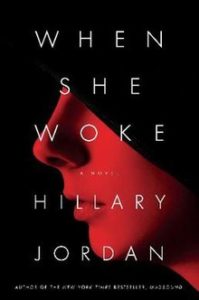
When She Woke by Hillary Jordan (2012)
Set in a future America where theocracy reigns, abortion is murder and privacy a thing of the past. A young Texan woman who, after having an illegal abortion, is administered a skin pigment-altering virus by the state. She is “Chromed,” marked as a criminal, and forced to navigate society in skin the vibrant primary shade of murderers.
“The narration provocatively questions what the United States would look like without choice and free will; shop windows display NO CHROMES ALLOWED signs, Holden Caulfield is on the Satan’s Pen list and satellite images, broadcast over the Internet, reveal the location of Chromes in real time. Visibility is entrapment for Hannah, and her life is fueled by the tension of feeling watched, of being enslaved by her skin … For concealing his identity, for protecting the man she loves, she is ostracized from her community, vilified. Jordan’s alienating social and political landscape echoes Hawthorne’s Puritan Boston … An inventive tale about a new America that has lost its way—whose values echo fundamentalism—When She Woke is, at its heart, a tense, energetic and lively paced story about self-discovery and reclamation in the wake of enormous shame. It is a story about the price of love.”
–Kathryn Savage (The Minneapolis Star Tribune)
*

George by Alex Gino (2015)
The story of Melissa (known to all as George), a fourth grader, who dreams of playing Charlotte, the female spider, rather than Wilbur, the male pig, in her school’s production of Charlotte’s Web. After Melissa comes out as transgender to her best friend Kelly, and in the process becoming known by her preferred name, the two devise a plan for Melissa to play Charlotte.
“The memorable central character of George is unlike almost any protagonist out there … George stands out for one contemporary twist: a fourth-grade production of Charlotte’s Web in which George dreams of playing Charlotte, the female spider, rather than Wilbur, the male pig. It’s not for political reasons; Charlotte is simply the role to which George most relates. With refreshingly little fanfare, Gino uses the ‘herself’ pronoun to describe how George sees, well, herself—despite a birth certificate that says otherwise. George may be the most right-now book imaginable. How do you talk to children about Caitlyn Jenner? Give them George (and watch I Am Cait together). Also, trust that when you tell a contemporary child that some people are born into a body they don’t identify with, most will blink, say, ‘O.K., cool,’ and ask what’s for dinner … After reading George, I pulled out my own dog-eared edition of E.B. White’s beloved novel and read this line: ‘Wilbur felt queer to be outside his fence, with nothing between him and the big world.’ It brought to mind the ending of George: Kelly lets Melissa (George’s name for herself) ransack her wardrobe to get dolled up for a girls’ day on the town. But unlike Wilbur, Melissa is thrilled to venture outside her fence, where she feels like her truest self.”
–Tim Federle (The New York Times Book Review)
*
The Natural Way of Things by Charlotte Wood (2016)
A novel depicting a world where women’s sexuality has become a weapon turned against them. The characters, each marked by a sex scandal with a powerful man, are silenced and shackled by a cruel system of corporate control and misogyny.
“The Natural Way of Things is a savagely, unapologetically feminist book; a throwback to writers like Joanna Russ and Angela Carter, who landed blows on the patriarchy without worrying about being labelled man-haters … Wood takes apart the mentality of patriarchy not with a scalpel, but an axe. However, the axe cuts deep. The often simplistic characterisation is not an error, but a strategy. This is not psychological fiction but a horror parable; a portrait not of people, but of tendencies. Seen as mythical archetypes, the characters are only too frighteningly real … The Natural Way of Things is chillingly dark and unfashionably didactic. But it’s also compulsively readable, and bears its load of significance with effortless power. The fury of contemporary feminism may have found its masterpiece of horror.”
–Sandra Newman (The Guardian)
*
American War by Omar El Akkad (2017)
The year is 2074. Oil is outlawed, that Louisiana is half underwater, and that unmanned drones fill the sky. El Akkad’s dystopian novel is about a second American Civil War, a devastating plague, and one family caught deep in the middle—a story that asks what might happen if America were to turn its most devastating policies and deadly weapons upon itself.
“…a surprisingly powerful novel—one that creates as haunting a postapocalyptic universe as Cormac McCarthy did in The Road (2006), and as devastating a look at the fallout that national events have on an American family as Philip Roth did in The Plot Against America (2004) … His familiarity with the United States’ war on terror informs this novel on every level, from his shattering descriptions of the torture endured by one of his main characters to his bone-deep understanding of the costs of war on civilians … There are considerable flaws in American War—from badly melodramatic dialogue to highly contrived and derivative plot points—but El Akkad has so deftly imagined the world his characters inhabit, and writes with such propulsive verve, that the reader can easily overlook such lapses … El Akkad has written a novel that not only maps the harrowing effects of violence on one woman and her family, but also becomes a disturbing parable about the ruinous consequences of war on ordinary civilians.”
–Michiko Kakutani (The New York Times)
*
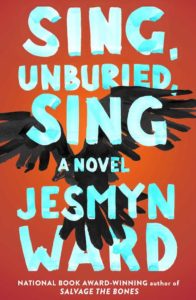
Sing, Unburied, Sing by Jesmyn Ward (2017)
An intimate, mystical portrait of racial tensions in the modern-day American South focusing on a few days the lives of a fractured Mississippi Gulf Coast family and the histories and ghosts that haunt it.
“Sing establishes Ward as one of the most poetic writers in the conversation about America’s unfinished business in the black South. Set post–Hurricane Katrina, the novel resonates at a time when the devastation of Hurricane Harvey and the protests and violence in Charlottesville see many Americans returning to missed lessons about racial identity and the Old South … Over and over in this novel, individual burdens tangle with long-held familial ones. By oscillating between past and present, Ward paints a picture of intergenerational trauma that feels almost inescapable. She returns often to the theme that everything ‘happens at once,’ and it’s difficult to distinguish where sorrow ends and desperation begins. Instead of allowing those memories to suffocate her characters, the novel interrogates what being tethered to a collective black experience means … She uses a haunting, magical-realist style to masterfully warp two of life’s most inflexible realities: time and death. Her book seems to ask whether a family or a nation can atone for inequities that remain well and alive.”
–Adrienne Green (The Atlantic)
*
New York 2140 by Kim Stanley Robinson (2017)
A novel set in New York in the year 2140, focusing on several residents of an apartment building in Manhattan after global warming has caused almost all of the world’s coastlines to go underwater.
“New York 2140 stands as the first major science fictional artifact of the Trump era, anticipating even in its articulation of the conditions of victory the fragility of progress and the likelihood of reversal … New York 2140 truly is a document of hope as much as dread and despair. And it’s a hope we’ll dearly need in the Anthropocene, the Anthropocide, the Capitalocene, the Chthulucene, postnormality, whatever you want to call the coming bad years that, with each flood and drought and wildfire and “superstorm,” we have to realize have already begun—our own shared moment of danger, as it now begins to wash up over our beaches, breach our levees, flash up at us in an ever-rising tide.”
–Garry Canavan (The Los Angeles Review of Books)
*
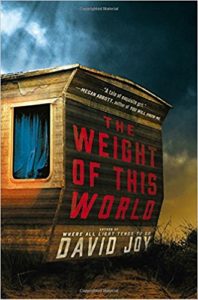
The Weight of This World by David Joy (2017)
An “Appalachian Noir” focusing on Thad Bloom, a damaged veteran of the war in Afghanistan. Thad returns to a dilapidated trailer in North Carolina to settle down when he and a childhood friend stumble upon a windfall of drugs and cash after witnessing the accidental death of their drug dealer. On a meth-fueled journey to nowhere, they will either find the grit to overcome the darkness or be consumed by it.
“David Joy’s bleakly beautiful tales of the rapacious drug culture of the Appalachian mountain dwellers of Jackson County, N.C., have a dreadful consistency. Every day, it seems, there’s ‘another story of another man killing another man in another godforsaken town.’ In The Weight of This World, a boy like Aiden McCall knows that ‘in time he would become his father’ — a man who told his wife he loved her before shooting her in the head and killing himself. That alone should explain why Aiden would choose a brute like Thad Broom for his best friend, remaining loyal even when Thad returns from military service ‘malformed and hardened by bitterness and anger.’ Their friendship forms the spine of this gorgeously written but pitiless novel about a region blessed by nature but reduced to desolation and despair.”
–Marilyn Stasio (The New York Times Book Review)
*
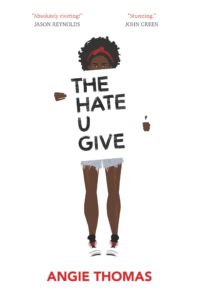
The Hate U Give by Angie Thomas (2017)
Starr Carter lives in two different worlds: her wealthy, mostly white private school and her poor, predominantly black neighborhood. The former is characterized by safety, strong academics, and casual racism, the latter by caring family and friends, sudden violence, and gangs. Starr’s two worlds converge when she witnesses the murder of her childhood friend Khalil by a white police officer
“Thomas’s debut novel offers an incisive and engrossing perspective of the life of a black teenage girl as Starr’s two worlds converge over questions of police brutality, justice, and act … As a book written for teens, The Hate U Give reminds readers of just how often racialized violence is carried out against that age group (Michael Brown was 18 when he was killed; Trayvon Martin was 17; and not-yet teen Tamir Rice was 12). And it illustrates how young people of color who might speak out to defend their late friends are unfairly criticized, as happened to Rachel Jeantel when she testified against her friend Martin’s killer, George Zimmerman. Thomas’s novel keenly understands the dangers of defaulting to the cop/vigilante versus ‘thug’ framing device: The deceased get put on trial, rather than their killers … thanks to Thomas’s absorbing storytelling, those who read The Hate U Give will be right beside Starr, grappling with understanding entrenched prejudice, where it comes from, and what role she—and those at home—have in exposing and combatting it.”
–Anna Diamond (The Atlantic)
*
How to Be Safe by Tom McAllister (2018)
A biting social novel about a recently suspended high school English teacher who is named a person of interest in the police investigation of a mass shooting at her school, and the chaos and irrationality that follows the tragedy.
“Tom McAllister’s How to Be Safe is as startling as the crack of a bullet. The story’s volatile tone tears through the despair of our era’s devotion to guns … Unemployed, depressed and allergic to sentimentality, Anna offers a vicious critique of her own experience in a poisonous male culture … acid wit makes How to Be Safe particularly unnerving. Anna delivers the most caustic lines with a straight face sharp enough to cut your throat … Like nothing else I’ve read, How to Be Safe contains within its slim length the rubbed-raw anxieties, the slips of madness, the gallows humor and the inconsolable sorrow of this national pathology that we have nursed to monstrous dimensions.”
–Ron Charles (The Washington Post)
*
Cherry by Nico Walker (2018)
After an aimless young man joins the Army as a medic and serves in Iraq, where he and his fellow soldiers take drugs to numb themselves to the traumatic violence that both appalls and titillates them, he returns home even more aimless and embarks on a life of opioid addiction and crime.
“The unnamed narrator of Cherry, Nico Walker’s coarsely poetic debut … provides an agonizing character study … The book is gritty, profane, and raw … Walker’s prose resembles that of Denis Johnson (particularly Jesus’ Son), only a little rougher around the edges. Indeed the writing here is conspicuously uneven. Its uncompromising nature at times feels less realistic than crude, less relentless than repetitious; character depth isn’t the primary goal here, but Walker doesn’t have a firm grip on Emily, a figure of both sympathy and culpability who lacks internal consistency. Walker’s expression still shines through. One major reason: Cherry doesn’t ask for pity. It presents a landscape ravaged by war and drugs, greed and pain, and introduces a voice that sounds ugly only until you read closely enough to see the beauty lying underneath an American tragedy.”
–David Canfield (Entertainment Weekly)
*
There There by Tommy Orange (2018)
Orange’s debut novel grapples with a complex and painful history, with an inheritance of beauty and profound spirituality, and with a plague of addiction, abuse, and suicide. It offers a kaleidoscopic look at Native American life in Oakland, California, through the experiences and perspectives of 12 characters.
“In Tommy Orange’s There There, an ambitious meditation on identity and its broken alternatives, on myth filtered through the lens of time and poverty and urban life, on tradition all the more pressing because of its fragility, it is as if he seeks to reconfigure Oakland as a locus of desire and dreams, to remake the city in the likeness of his large and fascinating set of characters … Orange makes Oakland into a ‘there’ that becomes all the more concretely, emphatically and fully so in a novel that deals, in tones that are sweeping and subtle, large-gestured and nuanced, with what the notion of belonging means for Native Americans … The novel, then, is their picaresque journey, allowing for moments of pure soaring beauty to hit against the most mundane, for a sense of timelessness to be placed right beside a cleareyed version of the here and now, for a sense of vast dispossession to live beside day-to-day misery and poverty. Nothing in Orange’s world is simple, least of all his characters and his sense of the relationship between history and the present. Instead, a great deal is subtle and uncertain in this original and complex novel.”
–Colm Toibin (The New York Times Book Review)
*
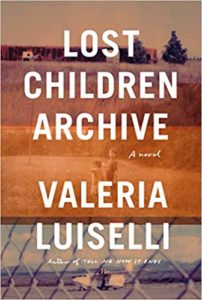
Lost Children Archive by Valeria Luiselli (2019)
An unnamed husband and wife drive, with their children in the backseat, from New York City to Arizona—he seeking to record remnants of Geronimo and the Chiricahua Apache, she hoping to locate two Mexican girls last seen awaiting deportation at a detention center—bearing tales of broken migrant families all the way down.
“In her last nonfiction book, Tell Me How It Ends (2017), Luiselli wrote about her work as a translator for Latin American families attempting to enter the U.S. This remarkable, inventive fictional take on the theme captures the anguish of those families through a deliberate piling-up of stories; reading it, you feel yourself slowly coming face to face with a world where masses of children are separated, missing, or dead of exposure in the desert … as the novel rises to a ferocious climax in a 20-page-long single sentence, Luiselli thunderously, persuasively insists that reckoning with the border will make deep demands of both our intellectual and emotional reserves. A powerful border story, at once intellectual and heartfelt.”

